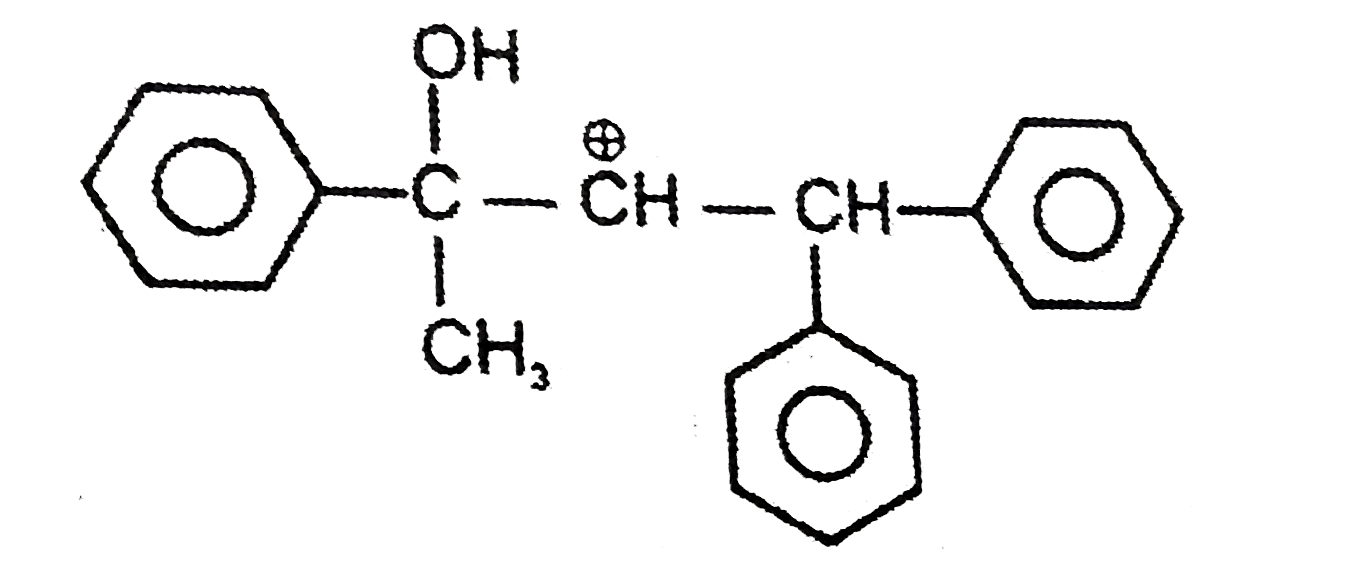Which of the following is not a rearrangement reaction ?




The correct Answer is:B
To determine which of the following reactions is not a rearrangement reaction, we will analyze each option provided in the question.
1. Identify the Reactions: We need to analyze the given reactions (let's label them A, B, C, and D) to determine if they involve rearrangement.
2. Analyze Reaction A:
- This reaction is described as a Beckmann rearrangement.
- Mechanism: The lone pair on the oxygen attacks a proton (H+), forming an intermediate. The nitrogen then attacks, and a water molecule is released, leading to the final product.
- Conclusion: This is a rearrangement reaction.
3. Analyze Reaction B:
- This reaction is described as the bimolecular production of a ketone.
- Mechanism: The reaction involves the formation of a ketone without any rearrangement of the molecular structure.
- Conclusion: This is not a rearrangement reaction.
4. Analyze Reaction C:
- This reaction is described as a Curtius rearrangement.
- Mechanism: Involves the migration of an R group and bond cleavage, leading to a new product.
- Conclusion: This is a rearrangement reaction.
5. Analyze Reaction D:
- This reaction is described as a Lossen rearrangement.
- Mechanism: Involves the abstraction of a hydrogen, formation of an anion, and subsequent rearrangement leading to a new product.
- Conclusion: This is also a rearrangement reaction.
6. Final Conclusion:
- Based on the analysis, the reaction that is not a rearrangement reaction is B (the bimolecular production of a ketone).
Answer:
The correct answer is B (the bimolecular production of a ketone).
---
- This reaction is described as a Beckmann rearrangement.
- Mechanism: The lone pair on the oxygen attacks a proton (H+), forming an intermediate. The nitrogen then attacks, and a water molecule is released, leading to the final product.
- Conclusion: This is a rearrangement reaction.
- This reaction is described as the bimolecular production of a ketone.
- Mechanism: The reaction involves the formation of a ketone without any rearrangement of the molecular structure.
- Conclusion: This is not a rearrangement reaction.
- This reaction is described as a Curtius rearrangement.
- Mechanism: Involves the migration of an R group and bond cleavage, leading to a new product.
- Conclusion: This is a rearrangement reaction.
- This reaction is described as a Lossen rearrangement.
- Mechanism: Involves the abstraction of a hydrogen, formation of an anion, and subsequent rearrangement leading to a new product.
- Conclusion: This is also a rearrangement reaction.
- Based on the analysis, the reaction that is not a rearrangement reaction is B (the bimolecular production of a ketone).
The correct answer is B (the bimolecular production of a ketone).
Topper's Solved these Questions
- ORGANIC REACTION MECHANISMBOOK - CENGAGE CHEMISTRY ENGLISHCHAPTER - ORGANIC REACTION MECHANISMEXERCISE - Assertion-Reasoning
12 Videos
- ORGANIC REACTION MECHANISMBOOK - CENGAGE CHEMISTRY ENGLISHCHAPTER - ORGANIC REACTION MECHANISMEXERCISE - Archives
8 Videos
- ORGANIC REACTION MECHANISMBOOK - CENGAGE CHEMISTRY ENGLISHCHAPTER - ORGANIC REACTION MECHANISMEXERCISE - Multiple Correct
30 Videos
- NCERT BASED EXERCISEBOOK - CENGAGE CHEMISTRY ENGLISHCHAPTER - NCERT BASED EXERCISEEXERCISE - Chemical Equilibrium
73 Videos
- P-BLOCK GROUP 13 - BORON FAMILYBOOK - CENGAGE CHEMISTRY ENGLISHCHAPTER - P-BLOCK GROUP 13 - BORON FAMILYEXERCISE - Exercise Archives (Subjecive)
9 Videos
Similar Questions
Knowledge Check
Which of the following do not give rearrangement of carbonation in the addition reaction of alkene?
ABr2/CCl4BHBrCHBr/H2O2,hvDOsO4Under common reaction conditions, a carbocation rearranges to another carbocation of equal or greater stability. For example, a secondary carbocation will rearrange to a tertiary carbocation. It will not rearrange to a less stable primary carbocation. This generalization is not absolute, and because there is not a high energy barrier to the rearrangement of carbocations, rearrangement to a less stable cation can occur if it offers the chance to form a more stable product.
In which of the following cations rearrangement takes place?A B
B C
C D
D
Cope rearrangement
View SolutionWolff rearrangement
View SolutionWolff rearrangement
View SolutionWolff rearrangement
View SolutionWhich of the following in the rearranged in the rearranged more stable carbocation of the given species?

View SolutionWhich of the following reactions is not a redox reaction?
View Solution
